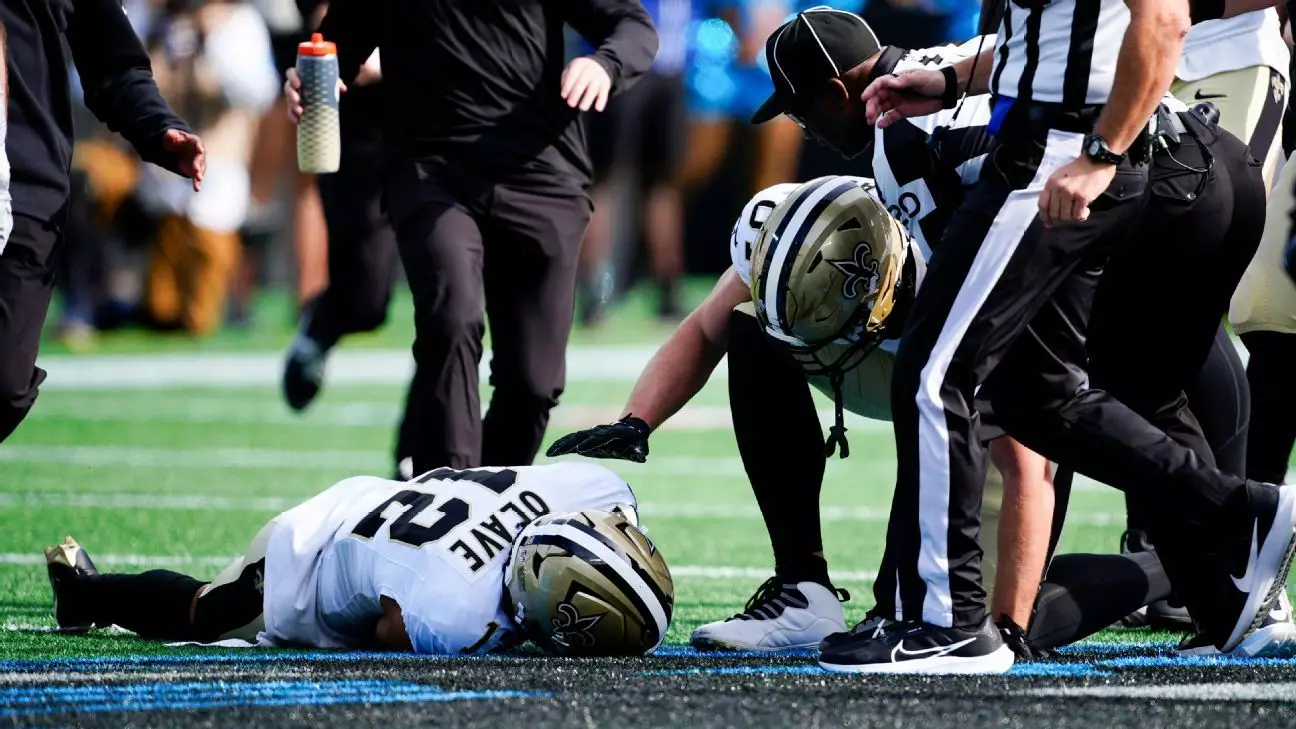In an age where player safety is paramount within the National Football League (NFL), the news surrounding New Orleans Saints wide receiver Chris Olave reveals the troubling realities of concussions in professional sports. Following a brutal hit during a game against the Carolina Panthers, which resulted in Olave being placed in the league’s concussion protocol for the fourth time in his career, the incident unveils deeper issues, from player safety protocols to interpersonal dynamics among teammates.
Chris Olave’s latest concussion occurred when he was struck in the head and neck by Panthers safety Xavier Woods, while attempting to catch a pass from quarterback Derek Carr. The incident, which happened midway through the first quarter, saw Woods penalized for unnecessary roughness—an unfortunate commonality in his career, marking his ninth offense of this nature since joining the league in 2017. The harshness of the game was apparent as Olave lay motionless on the field before being carted off amid a somber atmosphere populated by concerned players from both teams. While Olave later reassured fans on social media with a message of gratitude, the severity of recurrent concussions raises questions regarding safety protocols and the well-being of athletes who bear the physical burden of the sport.
Repeated concussions can have far-reaching impacts on an athlete’s career and life post-football. Research has established that players suffering from multiple head injuries are at a higher risk for long-term neurological issues—conditions that can detract not just from their athletic performance but could lead to debilitating health consequences later in life. Olave’s history of concussions, including previous incidents in his rookie season, underscores a critical need for improved awareness and preventive measures surrounding player health. Despite opting for a new helmet after a prior concussion, the unfortunate reality remains that the nature of football—rapid and often violent—presents serious risks that can, and have, interrupted promising careers.
In the aftermath of Olave’s injury, former Saints wide receiver Michael Thomas directed sharp criticism at Derek Carr via social media, suggesting that Carr’s throw led to Olave’s predicament. The conflict highlights a deeper issue: the strain between teammates in a highly competitive environment. Thomas’s disdain for Carr may stem from his own unresolved grievances regarding his tenure with the Saints, which have transformed into public outbursts. While players often clash, the current dynamics—especially during already tense periods—pose a threat not only to team morale but also to the fraternity that sports teams strive to cultivate.
Carr, who faced the heat of Thomas’s scrutiny, attempted to maintain his composure, expressing empathy for Olave while simultaneously addressing Thomas’s allegations. His comments reveal both a personal commitment to his teammates and an understanding of the complexities that emerge when relationships sour within a competitive setting. As Carr pointed out, the emotions surrounding injuries can elicit strong reactions, and managing these feelings is essential not just for individual players but for the holistic functionality of the team.
Olave’s situation ignites a broader discourse on concussions in the NFL—an issue that the league has grappled with for decades. With studies continually emerging about the long-term effects of head injuries, the NFL has undertaken various initiatives aimed at protecting players. However, tangible reforms are still essential. This begs the question: Is enough being done? While regulations regarding helmet safety and player evaluation have been implemented, the true test lies in their efficacy. As players like Olave continue to face undue risks, the league’s commitment to player safety must evolve beyond policy changes and take a firm stand to prioritize health over entertainment.
The collective concerns regarding concussions and teammate dynamics articulated in Olave’s recent incident encapsulate the precarious nature of professional sports. Athletes are not just competitors; they are individuals with physical and emotional vulnerabilities that demand protection. The tension within the Saints’ locker room, sparking from both injuries and personal conflict, serves as a reminder that success hinges on collaboration and understanding. As the NFL navigates its actions and strategies regarding player safety, the need for a robust support system—both on and off the field—becomes increasingly clear. The hope remains that the conversation ignited by incidents like Olave’s leads to real change; one that not only ensures better health outcomes for players but also nurtures a more cohesive team environment.


Leave a Reply